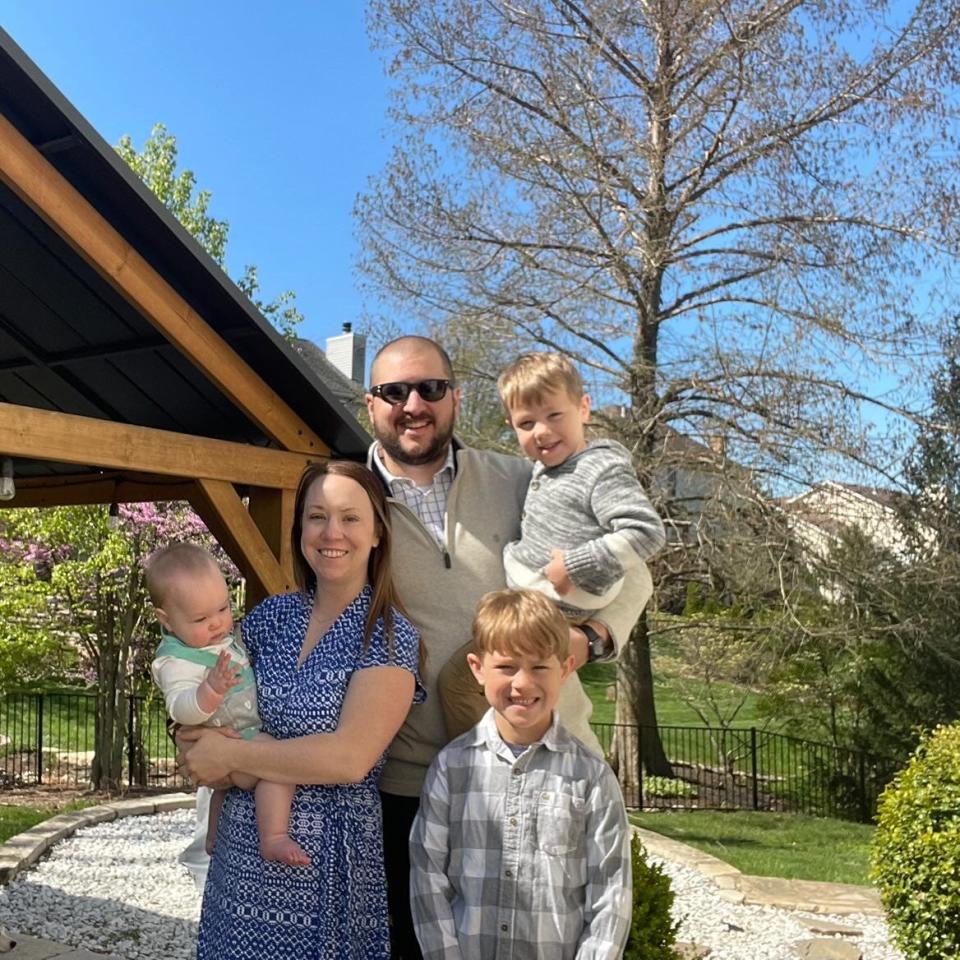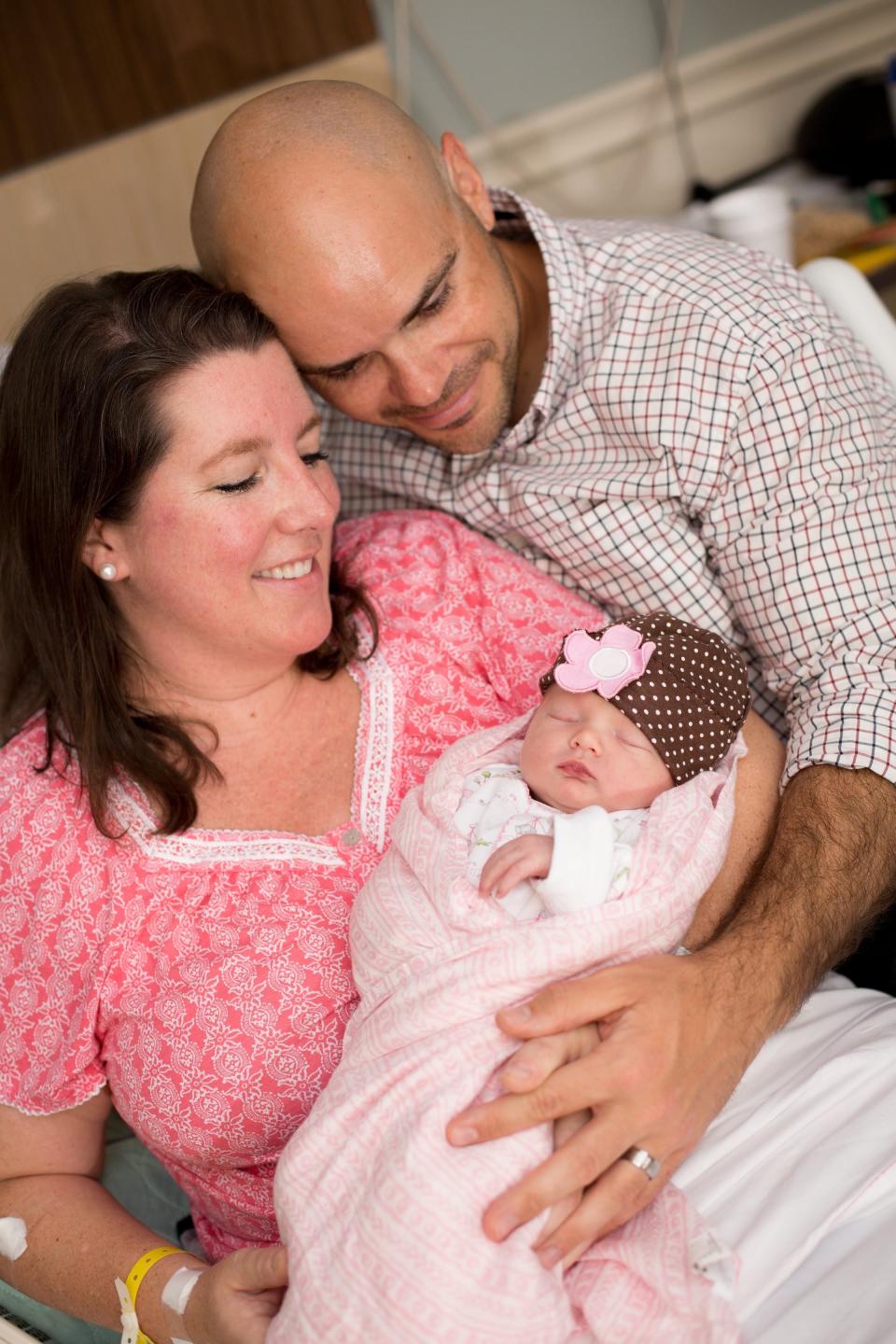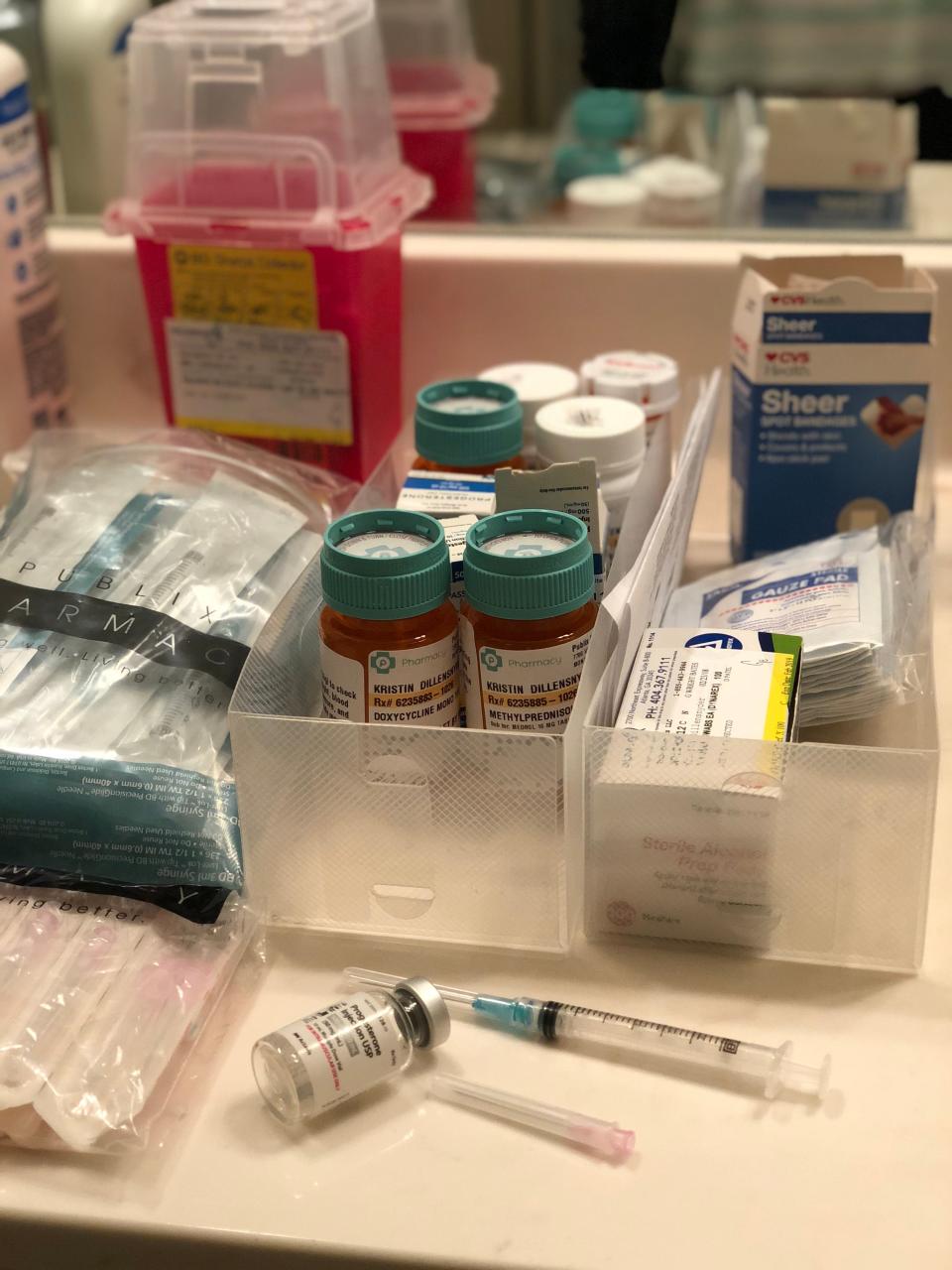Embryos and the election: Will the Alabama IVF ruling change how people vote?
With two healthy boys born by IVF, Crystal Rusch and her husband faced a deeply difficult decision: What should they do with their three remaining embryos that could one day become more children?
As Catholics, Rusch and her husband always believed in the sanctity of life, and they didn't want just destroy their embryos they had so painfully created with the help of doctors, fertility drugs and invasive procedures.
But they already had two sons, and the idea of having as many as five kids was overwhelming.
They prayed over their decision. Consulted a therapist. Talked with family. And in the end, decided it was their duty to give those embryos a chance at life, and had them implanted in her womb.
None of them grew.
"We trusted we would leave it in God’s hands whether or not we were meant to have any more kids," said Rusch, 35, who lives in St. Louis. "We loved our embryos very much as they were a symbol of hope of expanding our family and having a baby. But I will say we did not consider them our actual children. Don’t get me wrong, I mourned my embryos that did not take, but it felt like a 'different' loss than my miscarriages."

The distinction that Rusch makes between embryos and children is one the Alabama Supreme Court recently said doesn't exist, ruling that frozen embryos are "extrauterine children."
But it's a distinction that may help alter the trajectory of the presidential election, suddenly giving Democrats what they hope is a powerful new argument to engage independent and conservative-leaning voters who could tip the race for President Joe Biden. The Feb. 16 ruling has sent shockwaves around the globe as reproductive-rights advocates read the decision in horror ? a court ruling that laid bare their worst fears.
Voter interest is driving political action
While former President Donald Trump has criticized the Alabama ruling, experts say it was his Supreme Court picks who laid the groundwork for this change by overturning Roe vs. Wade.
Now, Democratic Party officials hope to harness new outrage to persuade wealthier, white conservative or independent women ? the largest recipients of IVF treatment ? to support Biden and his efforts to protect reproductive health care access, including IVF.
Sen. Tammy Duckworth, D-Ill., announced Tuesday that she plans to seek unanimous consent Wednesday from her colleagues on a bill to protect the right to IVF nationwide. Duckworth, who has two IVF children, has argued for years that any decision to overturn Roe would then impact IVF families. She contends that Republicans are trying to have it both ways by insisting they support families while simultaneously attacking reproductive rights.
Also on Tuesday, Florida lawmakers postponed a bill that would have criminalized harm to an "unborn child," concerned the law would also be applied to IVF. Such "personhood" laws were illegal when Roe was the law of the land. Personhood laws seek to define life as beginning at the moment of conception but often interpreted by some to apply only to conception that happens within a womb, not in a lab.
The 2022 midterm elections drew unusually heavy voter participation, particularly among young women who experts say helped stave off what had been expected to be large Republican gains. Additionally, a series of special elections and ballot initiatives nationally have seen rejections of abortion-ban legislation and candidates favoring draconian restrictions.
Experts say the Alabama IVF ruling may generate even more voter participation, especially because IVF tends to be more common among voters who might otherwise support a Republican presidential candidate campaigning on family values.
“The concept of what this means, that embryos have rights, is very different from someone thinking 'now I can’t pursue parenthood.' It's about the ability to become a parents on your schedule and at your choosing," said Shana Gadarian, a political psychologist at Syracuse University who studies how reproductive rights access motivates voters. "Now that we see this is a policy that’s affecting real people, it’s going to become even more unpopular.”
Family focused Christians have mixed views on IVF
The Alabama decision ripped open a long-simmering debate about the morality of IVF.
Christian opposition to abortion has long driven the debate over reproductive rights. Many abortion opponents say life begins at conception, and even a handful of cells deserves the same legal protections as a person. Some conservative states have passed laws specifying that life begins at conception, and the Alabama court leaned heavily on Christian faith and the Bible to make its case. The court referred to the embryos as "embryonic children ... kept alive in a cryogenic nursery."
In particular, some religions object to the modern process of extracting and fertilizing multiple eggs, screening the clumps of cells for genetic problems and overall viability and discarding weaker options. They also object to doctors implanting multiple embryos, monitoring which ones are developing best, and removing the others in a process known as "selective reduction."
The Catholic Church opposes most forms of IVF, especially selective reduction, but also any process that it says violates the marriage covenant, including having a doctor fertilize an egg with sperm, or using donor eggs or sperm.
"Since children are a wonderful gift of marriage, it is a good thing to try to overcome the obstacles which prevent children from being conceived and born," John Haas, president of the National Catholic Bioethics Center, wrote in a well-known 1998 explanation of the church's position. "But children are not engendered by technology or produced by an industry. Children should arise from an act of love between a husband and wife, in cooperation with God."
Today, about 2% of all babies born in the U.S. annually are conceived through IVF, and experts say there may be as many as 1 million frozen embryos stored nationally. In Alabama, the largest IVF providers paused work following the court decision, and some embryo-storage companies said they would no longer move embryos in or out of the state.
Politics is making IVF an election issue
Kristin Dillensnyder, 43, underwent IVF for three years while living in Alabama, starting in 2015. Based there due to her husband's military service, Dillensnyder had three embryos implanted. One failed, one pregnancy ended in a miscarriage and the third resulted in their daughter, Grace, now 6.
Raised Catholic, Dillensnyder said she's increasingly aware that some politicians say they support family values but don't actually follow through on their words. Dillensnyder is an IVF coach for other families undergoing the process, and she said a client texted her recently, at a loss over who to vote for during her state's Republican primary: Nikki Haley, who is more moderate on many issues but initially said she supported the court's decision, or Trump, who criticized it but also made it possible by appointing conservative Supreme Court justices who overturned Roe.

Dillensnyder said she sees a number of families who are "cafeteria Catholics," as they reject the church's opposition to IVF, and instead pick and choose what parts of the faith to abide by. She said many new IVF families are largely unaware of the political ramifications of the Roe decision. Their first priority is having children, so they don't typically focus on politics, she said.
But the Alabama decision, she said, has "pulled the curtain back" and forced IVF families to consider the impact of the election.
"I'm not screaming from the rooftops to move your embryos if you're in a red state. But I am saying that words from politicians don't matter ? their actions do," Dillensnyder said. "This is really going to get a lot more people involved in the election, for sure."
Decision leaves Republicans with a political balancing act
Katy Faust hopes the Alabama decision prompts more people to see IVF embryos as human life, not just a mechanical step in the reproductive process. The founder and president of the Seattle-based group Them Before Us, Faust said she believes the current IVF community is too quick to create and destroy embryos in a rush to help people have babies, no matter the moral cost.
"The fertility industry is built upon the degradation of children's rights," Faust said. "If clinics must regard these IVF babies as what they truly are ? human children ? then their processes of routinely creating more children than could ever be implanted, and subjecting embryos to genetic screenings, sex selection, and 'grading' for fitness, must be reconsidered. So yes, this will change the way patients and doctors approach IVF in the future. It's a change that is long overdue."
Faust said Republicans can't call themselves "pro-life" if they don't also oppose what she calls the "Big Fertility" approach to IVF-created embryos: "Of course, every child is a blessing, including the vast majority who die in the process, are donated to research, and who never make it out of the freezer."
Gadarian, the Syracuse professor, said the Alabama ruling puts Republicans in a tough spot. If they want to support families, she said, they have to split hairs on the IVF ruling so as to not offend conservative voters who also support IVF.
"The ruling on IVF is a real issue in 2024 that the Republicans would have rather not had,” she said.
Shortly after the Alabama ruling, National Republican Senatorial Committee executive director Jason Thielman sent a memo urging Senate candidates to "clearly and concisely reject efforts by the government" to restrict IVF. Thielman noted that about 78% of people who consider themselves pro-life, 83% of evangelical Christians and 86% of women support some form of IVF.
In Congress, more than 100 Republican House members had previously signed on to support the 2023 "Life at Conception Act," which contains language mirroring the Alabama court decision.
Reproductive-rights experts say personhood laws could ultimately lead to restrictions on some forms of birth control, and potentially open people up to criminal charges if they don't live a healthy life during pregnancy.
No longer voting straight party line
In Alabama, Democrat Marilyn Lands, 65, is running in a special election for the state House, and said conversations she's having with voters have taken a sharp turn since the court ruling.
"In the past couple of days, there's a real sense that we've gone too far," said Lands, who has made abortion access a key part of her campaign, along with her Christian faith. "What I hear, especially at the doors of voters, is a lot of people saying 'I always vote Republican but this time I'm really going to be looking at who is actually running.'"
This is Lands' second try for the Alabama House; she narrowly lost in 2022. She said abortion access and reproductive rights are forefront for many voters in a way they weren't two years ago.
"It's like we've unleashed something. I think people are beginning to go beneath the rhetoric and come to realize that we really are talking about freedom here," Lands said. "This has become the heart of this campaign. I'm beginning to see a movement there, about people being more thoughtful in their voting. They're beginning to make some connections."

In St. Louis, Rusch said her social media feeds are filled with IVF moms calling to keep politics out of their families. She shared a quote making the rounds on social media that she appreciates: "No one cares more about their embryos than IVF patients. No one understands more than IVF patients that an embryo does not equal a child."
Rusch said she hopes heart-wrenching decisions like the one her family faced remain between IVF patients and their doctors, without politicians "poking their nose in" into what is already a private space full of hope, heartbreak and moral questions.
"I can't say for certain whether or not this would impact the way I vote, but I can say I wouldn’t be surprised if I ended up voting for the politician who supports IVF rights," said Rusch, who considers herself right-leaning. "I'm not sure I could vote for a politician who makes laws that would make IVF even more difficult for those trying to conceive."
This article originally appeared on USA TODAY: Will Alabama IVF ruling sway voters from Trump to Biden?
